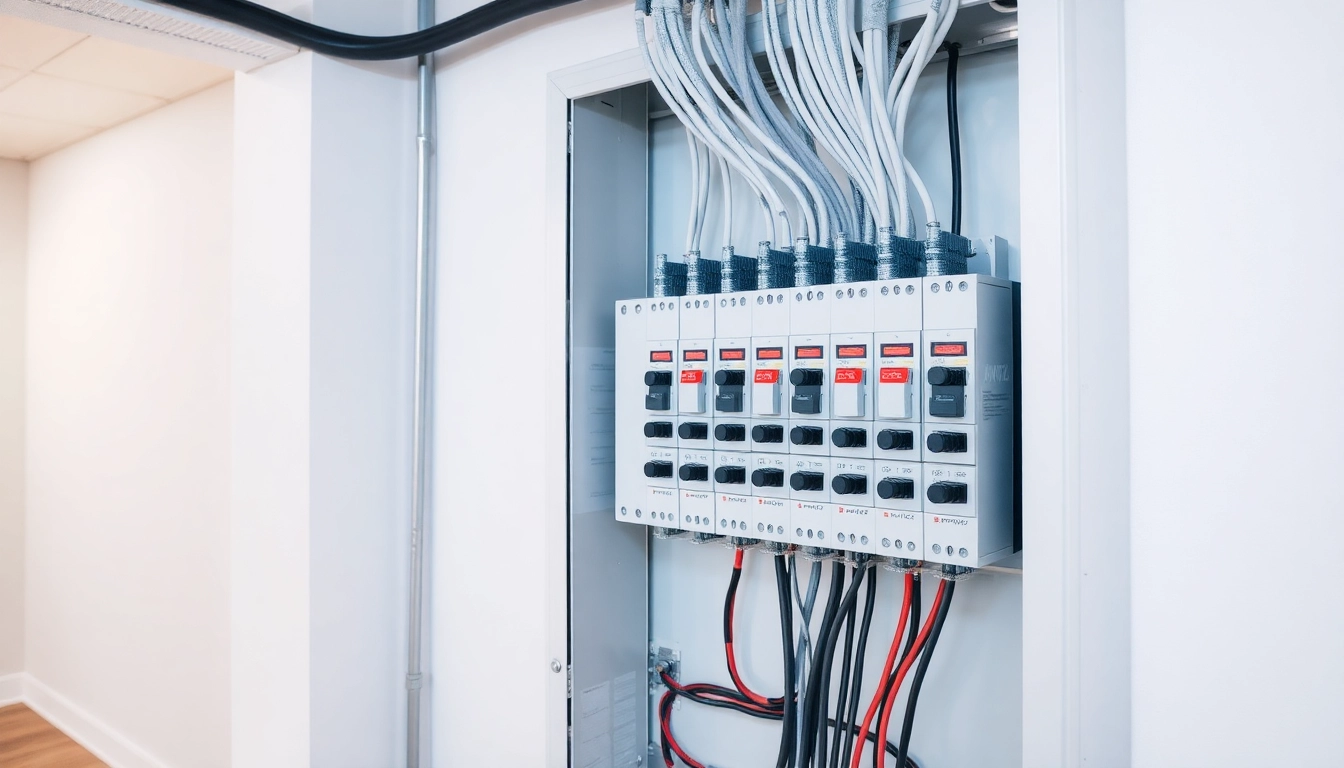What is an Electrical Panel?
Defining the Electrical Panel and its Purpose
An electrical panel, also known as a breaker box or fuse box, serves as the central hub for the electricity in your home. It is essential for managing and distributing electrical power to various circuits and appliances, ensuring that electricity flows safely and reliably throughout your household. Essentially, the electrical panel directs electrical current from the main service line to the different circuits located in outlets, lighting fixtures, and wired appliances.
Key Components of an Electrical Panel
Understanding the key components of an electrical panel helps homeowners appreciate its functionality and design. The primary elements include:
- Main Breaker: This component shuts off power to the entire panel. It serves as a safety feature and is crucial during maintenance or emergencies.
- Circuit Breakers: These devices protect individual circuits by automatically shutting off power in case of overloads or faults. They are replaceable and generally resettable.
- Bus Bars: Conductors that distribute electricity from the main breaker to the various circuit breakers in the panel.
- Ground Bar: A metal bar that connects to the grounding system of the home, ensuring that excess electricity is safely redirected to the ground, thus preventing electrical hazards.
How Electrical Panels Work
Electrical panels function through a straightforward system. Electric power enters the panel from the utility company via a main service line, and the main breaker monopolizes the incoming current. From there, the bus bars carry the power to the circuit breakers, which control the flow of electricity to individual circuits. When a circuit experiences a fault, the circuit breaker trips to prevent damage, overriding the flow. This mechanism is essential for maintaining the integrity of your home’s electrical system and safeguarding your appliances from electrical damage.
Signs Your Electrical Panel Needs an Upgrade
Indicators of Electrical Overload
As your home’s electrical needs grow—whether from increased appliance usage or renovations—your existing electrical panel may become overloaded. Here are some signs to watch for:
- Frequent Tripping of Circuit Breakers: If your breakers are frequently tripping, this may indicate that the panel is overwhelmed by current demands.
- Dim or Flickering Lights: Poor circuit performance is indicated by lights that flicker or dim when appliances are used, signaling insufficient power distribution.
- Unusual Smells or Heat: The smell of burning plastic or excessive heat emanating from the panel suggests a serious electrical issue.
It’s Time for a Replacement: Common Signs
Upgrading your electrical panel may be necessary if you notice the following signs:
- Old Panel Types: If your panel is more than 20 years old, it may lack the safety features and capacity required for modern electrical consumption.
- Fuses Instead of Breakers: Homes with fuse boxes rather than modern breaker panels should consider upgrading for improved safety and reliability.
- Corroded Connections: Rust and corrosion inside the panel can drastically reduce performance and lead to potential electrical failures.
Benefits of Upgrading Your Electrical Panel
Upgrading your electrical panel offers numerous advantages, such as:
- Increased Power Capacity: A new panel can support higher power needs, accommodating modern appliances and devices.
- Improved Safety: Upgraded panels reduce risks associated with overheating or electrical fires due to outdated technology.
- Enhanced Reliability: A modernized system ensures smoother energy distribution, minimizing interruptions and increasing efficiency.
Types of Electrical Panels Available
Exploring Different Electrical Panel Models
There is a range of electrical panel models, each suited for different needs and applications. The most common types include:
- Main Breaker Panels: These panels come with a main breaker that controls the entire electrical system, perfect for standard residential use.
- Subpanels: Ideal for adding circuits in detached garages or workshops, subpanels extend your electrical resources without overloading the main panel.
- Smart Panels: Innovative solutions such as SPAN Panels provide real-time energy monitoring and control, offering insights into energy usage patterns.
Comparing Circuit Breaker Panels and Fuse Boxes
Circuit breaker panels and fuse boxes serve similar functions but differ significantly in design and safety. While fuse boxes are older systems that require manual replacement of blown fuses, circuit breaker panels are equipped to reset automatically, providing a more user-friendly and safe experience. Furthermore, circuit breakers can handle much greater power loads, making them a preferable choice for most installations.
Choosing the Right Electrical Panel for Your Home
When selecting an electrical panel, consider the following factors:
- Power Requirements: Assess the total power needs of your home based on appliances, devices, and planned upgrades.
- Space Availability: Ensure there’s adequate space in your home for the panel and its associated circuits.
- Professional Assessment: Consult with a qualified electrician for a professional evaluation, ensuring that the chosen panel meets safety standards and performance expectations.
Maintenance Tips for Electrical Panels
Regular Inspections: What to Look For
To ensure that your electrical panel remains in good condition and operates safely, carry out regular inspections. Look for:
- Signs of wear such as rust or corrosion on components.
- Loose connections that may cause arcing or electrical fires.
- Tripped breakers or signs of overheating, including discoloration of nearby materials.
Cleaning and Upkeep of Your Electrical Panel
Conduct a routine cleaning of your electrical panel’s exterior and surrounding area to prevent dust accumulation that could impact performance. While cleaning, always ensure the panel is switched off, and if possible, consult a professional for any significant maintenance or internal cleaning.
Best Practices for Safe Operation
Safe operation of your electrical panel can prevent accidents and prolong the life of your system. Adhere to these practices:
- Never overload circuits by using multiple high-wattage devices on the same outlet.
- Keep the electrical panel accessible and ensure that nothing blocks the airflow or access to the panel.
- Engage a licensed electrician for any repairs or upgrades to ensure compliance with local codes and safety practices.
Cost of Upgrading Your Electrical Panel
Factors Influencing Replacement Costs
When discussing the costs associated with upgrading your electrical panel, various factors play a significant role, including:
- Type of Panel: More advanced panels, such as smart panels, typically carry higher costs than traditional models.
- Labor Costs: The electrician’s hourly rate can significantly impact the final price depending on your location.
- Additional Repairs: Issues such as outdated wiring or need for new breakers can add to your overall expenses.
Average Cost Estimates for Electrical Panel Upgrades
Upgrading your electrical panel can range between $1,000 to $3,000 on average, depending on the complexity of the project and type of panel. For instance:
- A standard 100-amp service panel may cost between $800 and $1,500.
- Upgrading to a 200-amp panel typically falls between $1,500 and $3,000.
- Smart panels can range even higher, depending on features and installation factors.
Financing and Planning for Your Upgrade
When planning for an electrical panel upgrade, consider your financial options. Homeowners may take advantage of financing plans offered by electricians or seek loans specifically for home improvements. Budgeting for the upgrade and considering long-term savings from increased efficiency will facilitate well-informed financial decisions.



